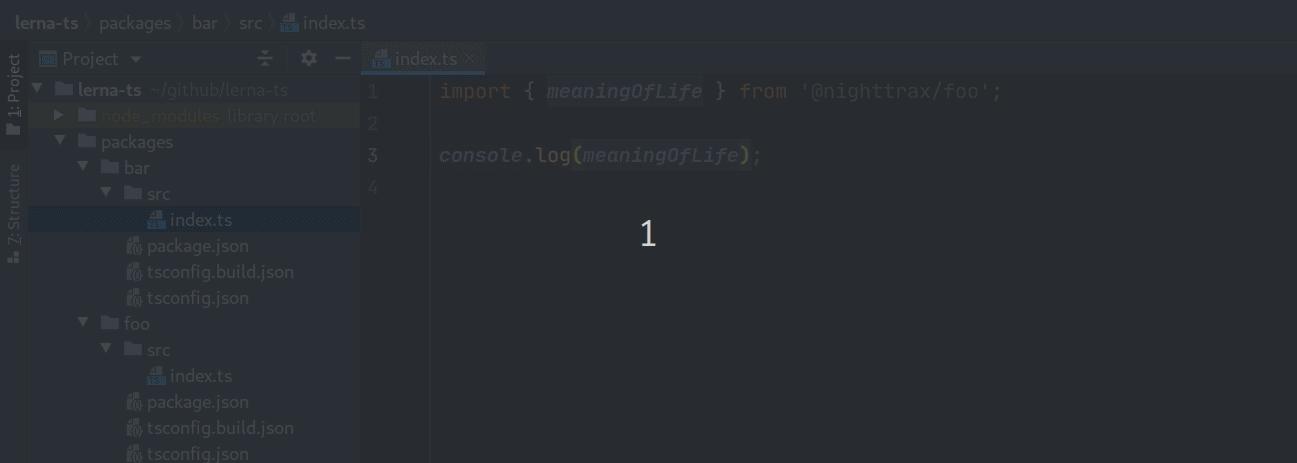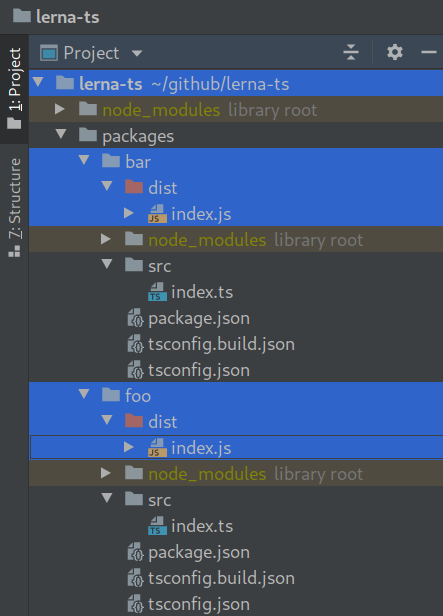Table of content
The main focus of this repo is making the
Go to definitionfeature in IDEs work without any surprises, meaning it will work after a fresh clone without needing to build the project.
The secondary focus is to remove surprises when publishing packages. The repo is set up so that each package gets a clean build output without any artifacts from other packages.
Everything else is kept to a minimum. Apart from my personal ESLint config to keep the code clean, there are no extra tools included — you're free to customize this to your own needs after cloning. Compilation targets, module systems, tree shaking etc. are left up to you to decide.
This main branch of this repo uses yarn workspaces, while the npm branch uses npm 7 workspaces.
yarn install
See the following blog posts:
- How to set up a TypeScript monorepo and make Go to definition work
- Making TypeScript monorepos play nice with other tools
If you're looking for the project references solution checkout the project-references branch.
This repo contains full examples of integrating with other tools and frameworks that need to be made aware that they're working with a monorepo. You can find each example in the examples/ folder.
Use tsconfig-paths to resolve the path aliases at runtime:
{
"scripts": {
"start": "ts-node -r tsconfig-paths/register src/index.ts"
}
}See the full example here.
Use babel-plugin-module-resolver to resolve the path aliases:
module.exports = {
presets: [
["@babel/preset-env", { targets: { node: "current" } }],
"@babel/preset-typescript",
],
plugins: [
[
"module-resolver",
{
alias: {
"^@nighttrax/(.+)": "../\\1/src",
},
},
],
],
};See the full example here.
Use tsconfig-paths-webpack-plugin to resolve the path aliases:
const TsconfigPathsPlugin = require("tsconfig-paths-webpack-plugin");
module.exports = {
resolve: {
plugins: [new TsconfigPathsPlugin()]
}
};See the full example here.
If you use Babel then see this example from the Babel section above.
If you use ts-jest then you can use its pathsToModuleNameMapper helper:
const { pathsToModuleNameMapper } = require("ts-jest/utils");
const { compilerOptions } = require("../../tsconfig.json");
module.exports = {
preset: "ts-jest",
moduleNameMapper: pathsToModuleNameMapper(compilerOptions.paths, {
// This has to match the baseUrl defined in tsconfig.json.
prefix: "<rootDir>/../../",
}),
};See the full example here.
Use craco or react-app-rewired to extend CRA's webpack config and apply the tsconfig-paths-webpack-plugin:
const TsconfigPathsPlugin = require("tsconfig-paths-webpack-plugin");
module.exports = (config) => {
// Remove the ModuleScopePlugin which throws when we
// try to import something outside of src/.
config.resolve.plugins.pop();
// Resolve the path aliases.
config.resolve.plugins.push(new TsconfigPathsPlugin());
// Let Babel compile outside of src/.
const oneOfRule = config.module.rules.find((rule) => rule.oneOf);
const tsRule = oneOfRule.oneOf.find((rule) =>
rule.test.toString().includes("ts|tsx")
);
tsRule.include = undefined;
tsRule.exclude = /node_modules/;
return config;
};See the full example here.
Extend Next's webpack config to enable compiling packages from the monorepo:
module.exports = {
webpack: (config) => {
// Let Babel compile outside of src/.
const tsRule = config.module.rules.find(
(rule) => rule.test && rule.test.toString().includes("tsx|ts")
);
tsRule.include = undefined;
tsRule.exclude = /node_modules/;
return config;
},
};See the full example here.
Include the path aliases in both tsconfig.json and tsconfig.build.json and tell NestJS where to find the main.js file:
{
"collection": "@nestjs/schematics",
"sourceRoot": "src",
"entryFile": "examples/nestjs/src/main"
}See the full example here.


